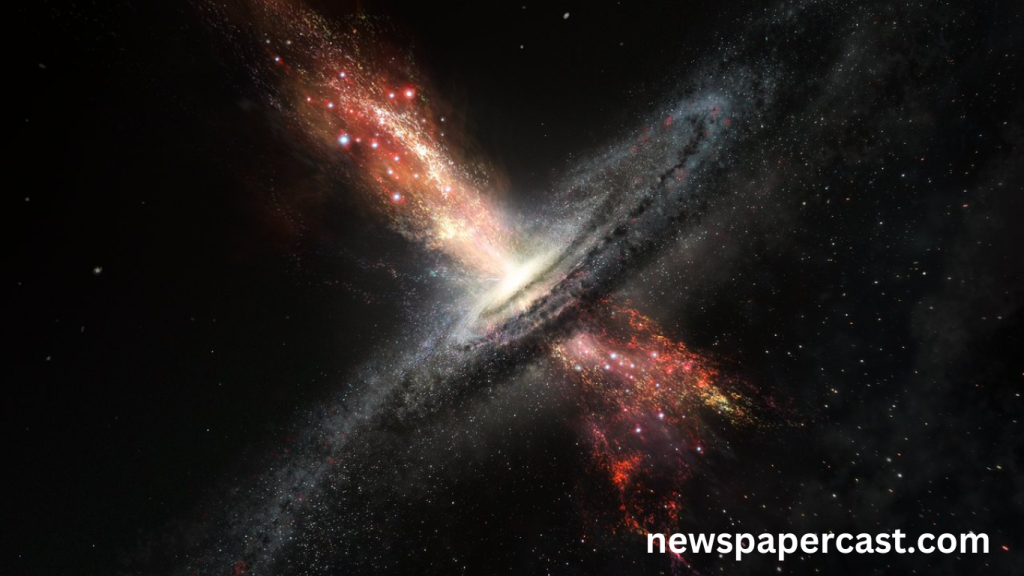Supermassive black holes are among the most enigmatic phenomena in the universe. These massive entities are millions to billions of times more massive than our Sun. Scientists believe that every large galaxy, including the Milky Way, harbors a supermassive black hole at its center. However, the recent discovery that a supermassive black hole is moving toward the Milky Way has raised many questions and concerns about its potential impact.
What is a Supermassive Black Hole?
A supermassive black hole is an astronomical object that is highly dense and has a powerful gravitational pull. It can devour anything that comes too close, including light, making it invisible. These black holes are believed to form through the merger of smaller black holes or the collapse of massive gas clouds.
How Close is the Supermassive Black Hole to the Milky Way?
Recent studies suggest that a supermassive black hole in a neighboring galaxy is moving toward the Milky Way. While it is not expected to collide with our galaxy directly, its approach could lead to significant gravitational interactions. The distance remains vast, but the idea of this cosmic dance raises new possibilities for galactic evolution.
What Would Happen If the Supermassive Black Hole Collides with the Milky Way?
A collision with another galaxy’s supermassive black hole could cause massive disturbances, including the rearrangement of star systems and the formation of new black holes. However, most scientists agree that while a direct collision might not happen, the gravitational forces at play could lead to the disruption of the Milky Way’s stellar population.
Read More : Meet 10 Women in Science Who Changed the World
How Do Supermassive Black Holes Move Through Space?
Supermassive black holes do not remain stationary. They move through space as a result of the gravitational influences of surrounding stars and galaxies. When two galaxies collide, their black holes can spiral toward each other and eventually merge, which is what scientists believe is happening between the Milky Way and the approaching black hole.
Can the Supermassive Black Hole Affect Our Solar System?
While the approaching black hole is unlikely to have a direct impact on the Solar System, its gravitational forces could affect the orbits of nearby stars. Over long periods, these gravitational effects could change the structure of our galaxy and influence the trajectory of certain stars, though our Sun is not in immediate danger.
What Role Do Supermassive Black Holes Play in Galactic Evolution?
Supermassive black holes are believed to play a key role in the formation and evolution of galaxies. Their immense gravity can shape the galactic core, influencing the movement of stars and gas. Additionally, black holes are thought to regulate star formation by expelling energy that suppresses the creation of new stars in their vicinity.
How Are Scientists Monitoring the Movement of the Supermassive Black Hole?
Scientists use advanced telescopes and other observational tools to track the movement of supermassive black holes. Instruments like the Hubble Space Telescope, the Event Horizon Telescope, and the upcoming James Webb Space Telescope help astronomers study the behavior of these cosmic giants by observing the surrounding stars and gas clouds.
Will There Be Any Long-Term Effects on Earth?
While a supermassive black hole heading toward the Milky Way is a fascinating concept, there is no immediate threat to Earth. The event, if it ever happens, would take billions of years to unfold, giving ample time for potential discoveries and observations. However, the study of such phenomena could yield valuable insights into the fundamental workings of the universe.
Frequently Asked Questions
What exactly is a supermassive black hole?
A supermassive black hole is an extremely dense, large black hole found at the center of galaxies. It contains millions to billions of times the mass of the Sun.
Will the approaching black hole destroy the Milky Way galaxy?
The black hole’s approach will likely not destroy the Milky Way, but gravitational interactions could significantly alter its structure.
How do supermassive black holes move through space?
Supermassive black holes move as a result of gravitational forces, often influenced by nearby stars and galaxies.
Can our Solar System be affected by a supermassive black hole?
While unlikely to impact our Solar System directly, the gravitational forces from an approaching black hole may alter nearby star orbits.
How do scientists track black hole movement?
Scientists use powerful telescopes like Hubble and specialized instruments to track the movements and gravitational effects of supermassive black holes.
What is the role of supermassive black holes in galaxy formation?
Supermassive black holes influence the shape and development of galaxies, regulating star formation and controlling the flow of energy in the galactic core.
How long will it take for the black hole to reach the Milky Way?
The event would occur over billions of years, allowing plenty of time for scientific observation.
Could this event lead to the formation of new black holes?
Yes, the collision or close encounter between black holes could lead to mergers, creating new supermassive black holes.
Conclusion
Though a supermassive black hole approaching the Milky Way sounds alarming, it presents no immediate threat to our planet. Scientists are closely monitoring the event, which could lead to valuable insights into galactic behavior and evolution. The long-term effects, if any, will unfold over billions of years.

